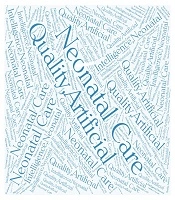Dear Editor,
The quality of neonatal care is a critical aspect of healthcare that demands significant attention in Iran, particularly in light of policies promoting population growth. Over the last three decades, Iran has made remarkable progress in reducing the neonatal mortality rate, dropping from 31.8 (28.1, 35.5) per 1000 live births in 1990 to 6.8 (6.1, 7.4) per 1000 live births in 2019 (1). However, it is essential to acknowledge the limitations of Iran's death registration system, which suffers from data scarcity and incompleteness. As a result, the system does not provide complete coverage of neonatal mortality (1). Addressing these limitations is essential but challenging, as it requires improving research infrastructure, enhancing data collection methods, and increasing resource accessibility.
The use of artificial intelligence (AI) is one of the new approaches in the field of medicine and healthcare services. Artificial intelligence refers to technology that enables computers to simulate human thinking and learning processes (2). This technology allows us to create more complex models for problem-solving and predicting outcomes using mathematical algorithms (2). We wish to shed light on the transformative potential of AI in revolutionizing neonatal care and improving the overall health outcomes of the youngest patients. Here are some specific areas in which AI can play a critical role:
- Medical data analysis, early detection, and data-driven predictions: Utilizing AI in the analysis of medical images has shown promising potential in neonatal care. Today, physicians and healthcare professionals have access to advanced tools that help them interpret complex patterns and make well-informed decisions (3). Artificial intelligence can efficiently identify modifiable predictors of neonatal complications, facilitating early detection and timely interventions through the rapid analysis of medical data (3). Incorporating AI into neonatal care holds significant promise for improving patient outcomes and enhancing the overall quality of healthcare delivery in this critical domain. Moreover, predictive algorithms driven by AI can promptly detect health issues in pregnant women, leading to enhanced outcomes through clinical decision-making and intervention, thus reducing the risk of neonatal mortality (3).
- Health education and remote consultation: Despite the fact that AI is currently utilized in medical education mainly for clinical specialty training (4), it can also elevate the knowledge and skills of healthcare professionals and mothers by providing specialized educational resources. Artificial intelligence-powered platforms enable remote consultations, bridging the gap between parents and healthcare providers (4).
- Optimizing Resources: Artificial intelligence’s algorithms in healthcare resource allocation have great potential to effectively distribute resources based on data analysis and optimized outcomes. Artificial intelligence can identify at-risk cases, predict complications, and enhance workflow efficiency for healthcare providers (5). Nevertheless, ethical concerns and biases need attention and thoughtful consideration in the context of AI-driven healthcare resource allocation (5).
Incorporating AI into neonatal care to advance healthcare practices holds immense promise. Embracing these technological advancements is crucial to ensure the well-being of our youngest members of society. Our healthcare system should acknowledge and adopt these innovations to create a healthier future for the next generation. It is also important to address the essential limitations of AI technology to ensure its appropriate utilization.
